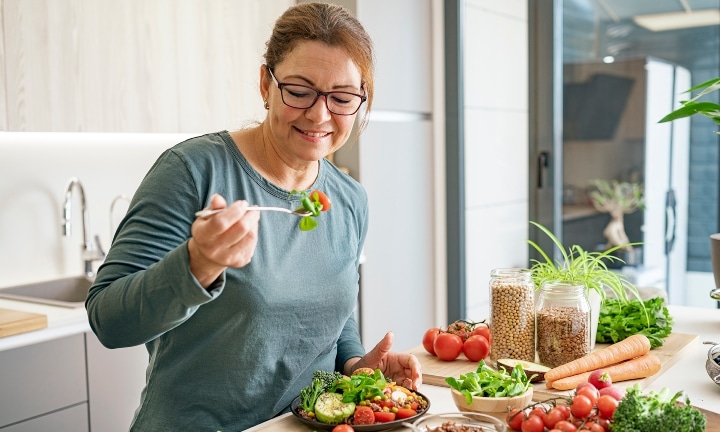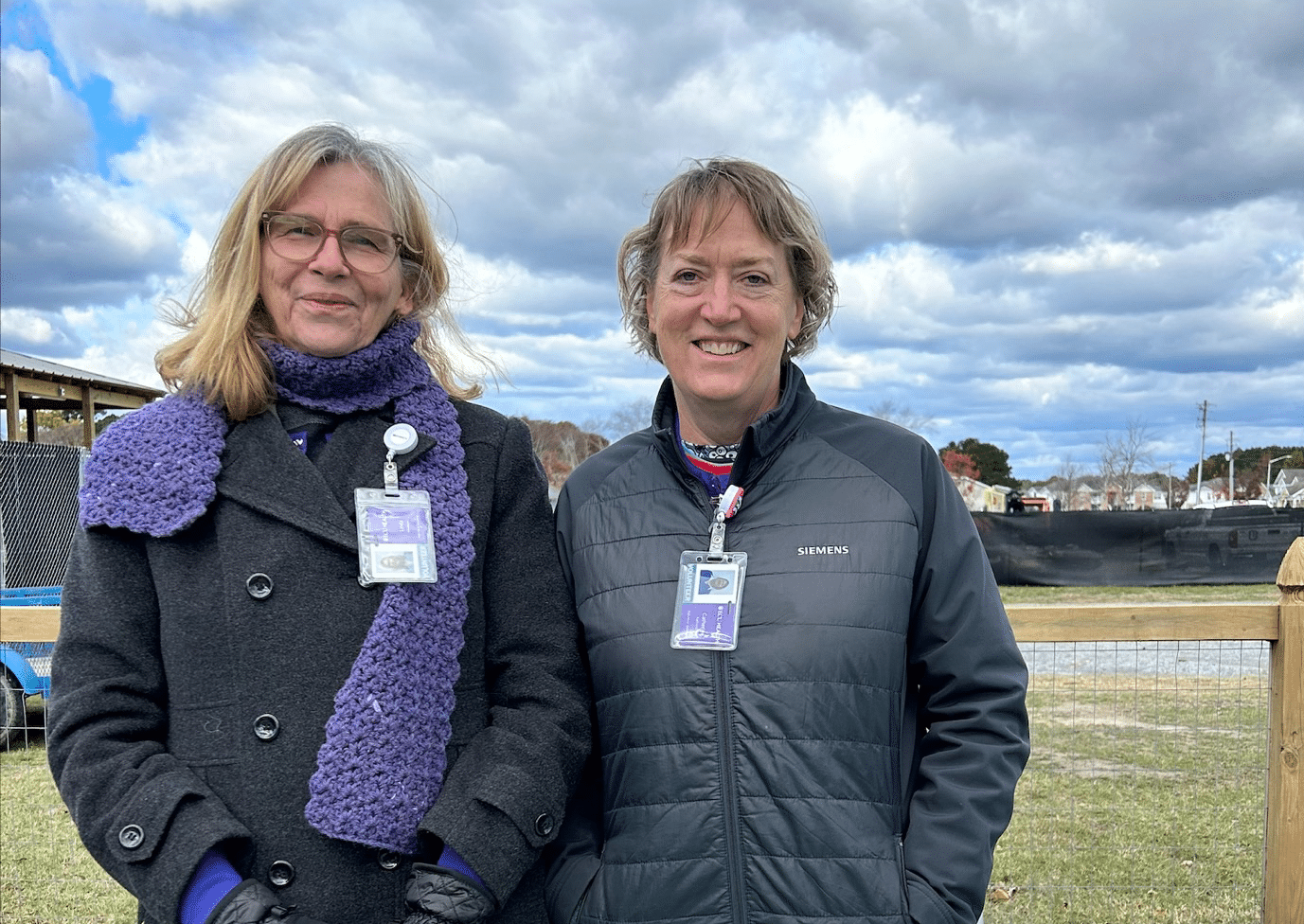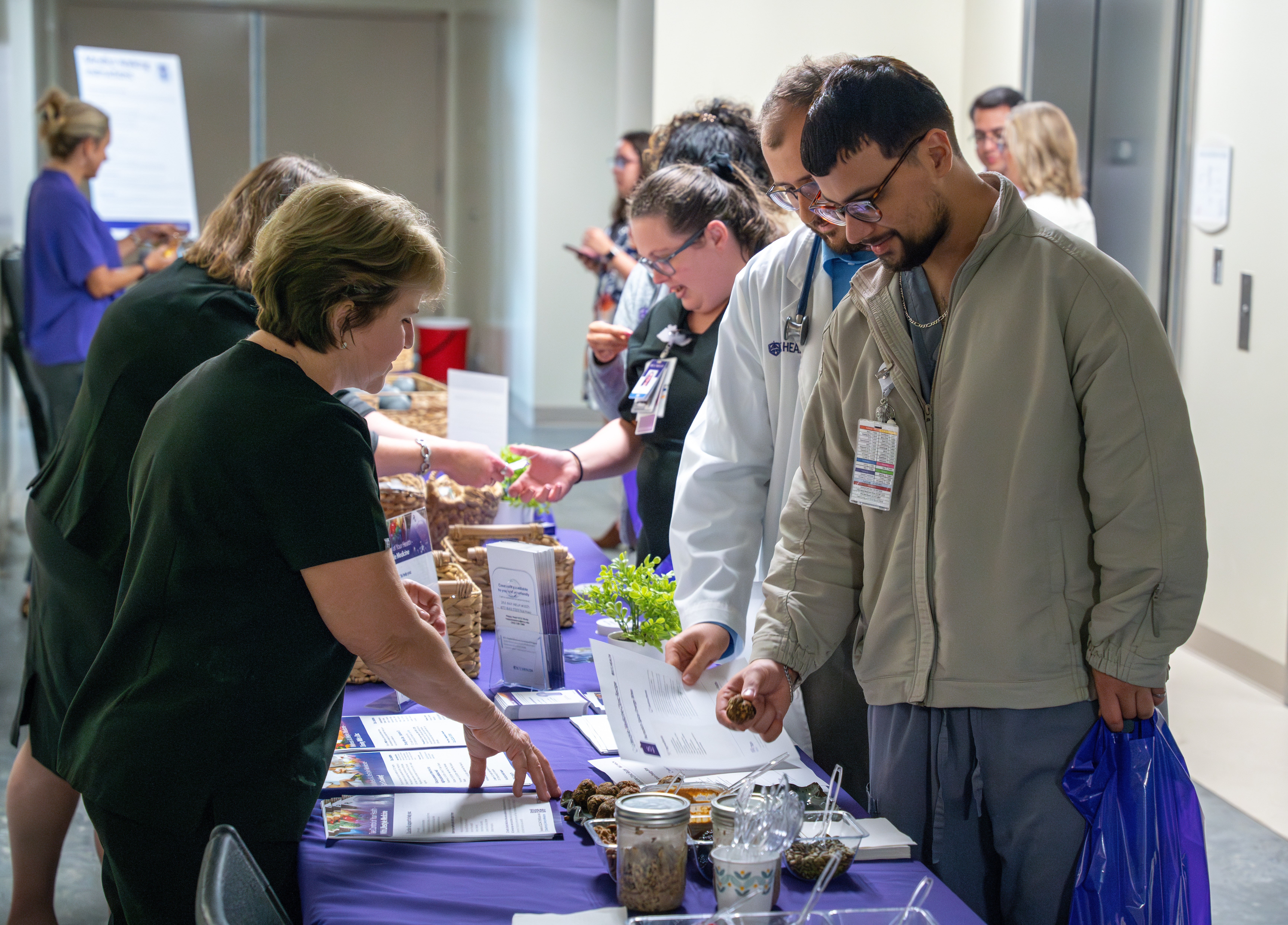Scott Alford, the manager for grounds and guest parking at ECU Health Medical Center, generally considered himself to be healthy. Then, in 2023, Alford received some surprising news: his A1C, a blood test that measures the average blood sugar level over the last two-to-three months, was 10.9. For reference, a normal A1C level is less than 5.7. Prediabetes is 5.7 – 6.4, and diabetes is 6.5 and higher. “I was clearly in the diabetic category,” Scott said. “I asked the doctor what I should do. He gave me two medications and told me we’d revisit the issue at my next appointment.”
That solution didn’t sit well with Scott, so he made a decision. “I knew about ECU Health’s Lifestyle Medicine clinic because I knew some co-workers had used it,” he said. “I called them up and told them my story. They wanted to get me in right away. By the end of that call, I had an appointment with the nutritionist and a lifestyle coach for the very next week.”
Lifestyle Medicine is an evidence-based approach to preventing, treating and reversing diseases through healthy behaviors, and the ECU Health Lifestyle Medicine clinics offer many individual, group and virtual services to help community and team members meet their personal health goals.

“Our team of professionals includes providers, registered dieticians, lifestyle coaches, exercise physiologists, nurses and chefs who recognize the importance of including the six pillars of lifestyle medicine into the individualized care plans for our patients and team members,” said Brenda Leigh, the director of Lifestyle Medicine at ECU Health. The six pillars include increasing the consumption of whole, plant-based food, increasing aerobic activity, getting enough sleep, decreasing unhealthy substances (like tobacco or alcohol), maintaining healthy relationships and managing stress.
Scott first met with Lindsay Luschwitz, clinical dietitian III, to begin his Lifestyle Medicine journey. “I don’t drink and I don’t smoke, but I did drink between five and seven big soft drinks or sweet teas a day,” Scott shared. “I was also in the habit of stopping at McDonald’s every morning for breakfast and going out for lunch every day.”
When Scott shared this information with Lindsay, she didn’t shame him as he expected. Instead, she gave him different strategies and choices to try. “When we first met, Scott told me he wasn’t going to bring his lunch to work,” Lindsay recalled. But after working with Lindsay for more than a year, Scott said he now brings his lunch to work most days of the week. “She never said it was something I had to do,” Scott said. “It was always my decision. She’d suggest options and sometimes I liked them and sometimes I didn’t.”
Now, Scott drinks water or Sprite Zero instead of regular sodas and sweet tea, and he eats smaller portions while making better choices. “I eat more fruit now than I ever have in my life,” he said. Lindsay also suggested he use an app, Yuka, on his phone to track the nutritional value of the foods he ate so he could make informed decisions. “I love ice cream,” Scott said. “And I used the app to find an ice cream I could eat. I took the options to Lindsay and she pointed me to a Greek yogurt brand that I really like.”
The work paid off. In 2024, at his next doctor’s appointment, Scott was pleased to find that he was down 25 pounds and his A1C was a 5, well within the normal blood sugar guidelines. He is now off all his daily meds and only takes a once weekly medication to help. “I am practicing the strategies Lifestyle Medicine gave me. I’ve improved my diet, and I’ve increased my exercise. And I can see the difference in the mirror. I’m down a size in my pants and shirt. My joints don’t hurt so much when I stand up from a chair, and my vision, which I thought was an issue with my contact lenses but was actually due to high blood sugar, has improved. I just feel better.”
Scott’s co-workers also noticed changes, and some approached him about what he was doing. “They initially noticed I wasn’t going out to eat for lunch as often, so I talked with them about what I was doing.”
Scott has been doing more than just sharing information; he’s also been a key player in encouraging his team to get healthier. “Lindsay shared during one of our bimonthly meetings that they had a teaching kitchen in the Lifestyle Medicine Clinic within the Wellness Center and they wanted to have people come out and learn recipes and information about healthier meal options. I told her I’d bring my team, and that’s what I did.” Scott brought members of his grounds and parking team to the Wellness Center for an hour-long session with Lindsay, Dr. David Michael and Dr. Susan Houston, where they cooked, ate and talked about how the Lifestyle Medicine clinic can help.
“This is our Dining with a Doc series,” Lindsay explained. “Dr. Houston and I are culinary trained chefs, so she or I prepare a meal, and Dr. Michael is there, and we talk about the meal we’re making and nutrition. And then we go through Lifestyle Medicine and what we do.” The Lifestyle Medicine clinic offers the monthly Dining with a Doc program free for community members through a grant from Pitt Partners for health. As a result, Alford said other members of his team are now making positive changes and some are visiting the Lifestyle Medicine clinic.
While it hasn’t always been easy to make these lifestyle changes, Scott said they’ve been worth it. “It’s tough sometimes. Life is busy, and sometimes you just have to decide to get more steps or stand up rather than sit at your desk. But the clinic has made things easier because they give me information that’s proven to help.” And, he emphasized, seeing and feeling the difference has been key. “At first it was that 10.9 A1C that made me want to change,” Alford said. “That number really shocked me. But now I can also see and feel a difference and that’s why I want to keep doing this. It’s a conscious decision every day to make the best choices.”
Lindsay emphasized that a person knowing their “why” is very important. “We are here to support you and give you education and resources, but when you’re not here, the choice is up to you. If you know your ‘why,’ you won’t revert to old habits,” she said. Scott agreed, saying that he plans to continue practicing the new skills he’s learned the past year. “I intend to keep using these strategies,” he said. “Doing better isn’t that hard; all I had to do was ask for that support. Lifestyle Medicine has a great program, and you just have to reach out to them and take that first step.”
Both Scott and Lindsay want more people to also take that first step to learn more about the Lifestyle Medicine clinic and the services it offers. “It was incredibly easy to get started,” Alford said. “I called them and there was no excess stuff to do, no preapproval, no paperwork. It’s an easy in and out, and if you can’t make it in person, they’ll do telehealth visits.” Supporting team members in this way is very important, Lindsay said. “We want to target our team members because it benefits everyone,” she said. “Healthier team members are more productive, have fewer sick days and are generally happier. We want to expand our reach and make it more approachable.” Lindsay noted that they take various forms of insurance, and for ECU Health team members on the medical plan, they are eligible for up to six free visits with a dietitian, among other free services. “Our message is that many chronic issues like diabetes, obesity and high cholesterol can be improved by lifestyle changes and nutrition. Even if you’re not ready to make a huge change, we’re ready to meet you where you’re at.”
To learn more about the Lifestyle Medicine clinic, Leigh encourages community and team members to visit their website here or call at 252-847-5590 for more information.
Achieving and maintaining a healthy weight can be a challenging journey, but ECU Health has resources to help with a comprehensive range of weight loss and lifestyle medicine services tailored to individual needs. Whether someone is starting their weight loss journey or seeking support to maintain progress, ECU Health offers personalized, evidence-based solutions to help people succeed.
Dr. Hannah Florida, a board-certified physician in obesity medicine at the ECU Health Lifestyle Medicine Clinic, emphasized the importance of addressing obesity holistically.
“Excess body weight is multifactorial, often influenced by unhealthy nutrition, lack of physical activity, poor sleep, unmanaged stress, a lack of support systems and substance dependence – whether that be caffeine, sugar or another substance,” Dr. Florida said. “Our approach is to meet patients where they are, assess what changes they are ready to make and guide them with the tools and accountability they need to succeed.”
ECU Health Lifestyle Medicine provides a multidisciplinary team of experts, including board-certified obesity physicians, registered dietitian nutritionists, lifestyle coaches and exercise physiologists. Together, they offer comprehensive care to address every aspect of weight management, ensuring patients receive the support they need at every step.
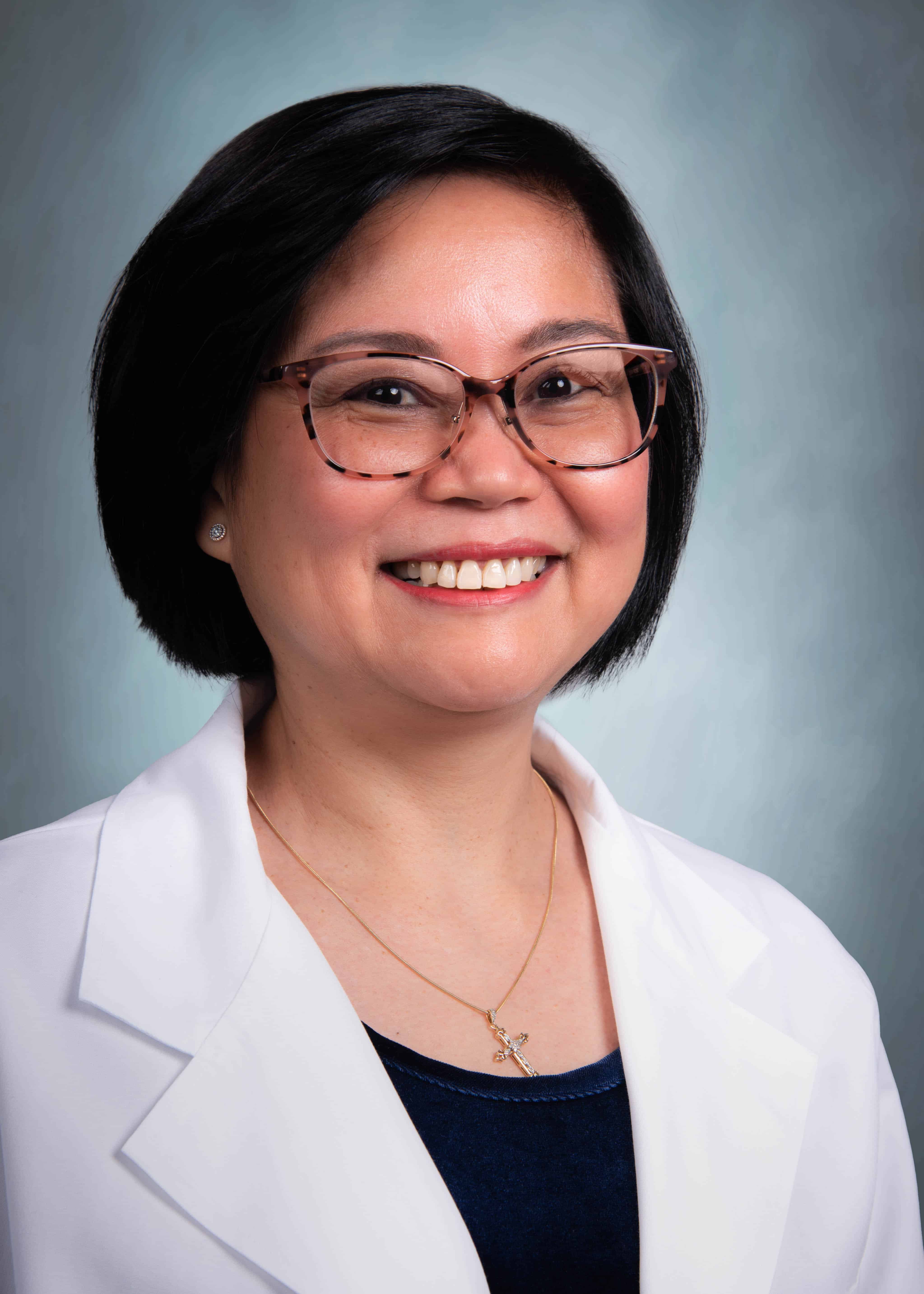
No two weight loss journeys are the same, which is why ECU Health offers customizable programs to fit a variety of needs:
- Medically Supervised Weight Loss: Tailored treatment plans, including lifestyle modifications and medications, prescribed by board-certified obesity physicians.
- Medical Nutrition Therapy: Personalized assessments and eating plans from licensed dietitians to support sustainable weight loss and address conditions like diabetes and high cholesterol.
- Meal Replacement Programs: Supervised liquid meal replacement plans to jumpstart progress.
- Culinary Medicine: Individual and group sessions teaching participants how to prepare plant-based meals that align with their goals.
- Pre-Surgery Optimization: Dietitian-guided programs to optimize nutritional health before bariatric or orthopedic surgery for improved outcomes.
Dr. Florida uses anti-obesity medications when appropriate to jump start patients in making lifestyle changes. These healthy lifestyle changes are the key factors to achieve sustainable long term weight loss, according to Dr. Florida.
“Medications, for example, can temporarily suppress appetite, but lasting results require adopting healthier habits,” she said.
Lifestyle coaches at ECU Health help patients set and achieve specific goals, such as improving sleep, managing stress, or incorporating regular exercise.
“For instance, if someone struggles with getting enough sleep, the coach might help them set small, actionable goals like limiting screen time before bed,” Dr. Florida said.
Exercise physiologists at ECU Health further support patients by creating personalized exercise plans. These programs often begin with one-on-one guidance and transition patients to sustainable fitness routines, whether through gym memberships or at-home activities.
Addressing obesity not only improves physical well-being but can also alleviate related chronic conditions such as diabetes, hypertension, chronic pain, and kidney disease.
“When we treat obesity, we often see significant improvements—or even reversal—in these chronic conditions,” said Dr. Florida.
ECU Health’s Lifestyle Medicine Clinic offers flexible options for individual appointments, group-based education, and cutting-edge culinary medicine.

“Our goal is to meet patients where they are and empower them to make sustainable changes,” says Dr. Florida.
For some individuals struggling with weight-related health issues such as diabetes, heart disease, high blood pressure, arthritis and sleep apnea, bariatric surgery may be the most effective solution.
ECU Health Medical Center offers advanced surgical options, including:
- Gastric Bypass: Reduces the amount of food you can eat and the calories you absorb by creating a small stomach pouch that connects to the small intestine. This helps you feel full faster and absorb fewer calories.
- Sleeve Gastrectomy: Removes up to 85% of the stomach, creating a sleeve-like structure that holds less food and reduces hunger hormones.
Bariatric surgery often results in greater weight loss compared to medical treatments alone and can significantly improve chronic conditions linked to obesity. While surgery is highly effective, it is not without risks, including bleeding, infection and nutritional deficiencies. Speak with your primary care provider to learn if this option is right for you.
Ready to Begin Your Journey? Take the first step toward a healthier you with ECU Health. To learn more about ECU Health’s weight loss services at the ECU Health Lifestyle Medicine Clinic or to schedule an appointment, visit the ECUHealth.org/LifestyleMedicine or call 252-847-9908.
ECU Health Beaufort Hospital, a campus of ECU Health Medical Center, brought the community together to celebrate healthy living at its third annual Fall Harvest Event. Held at the Community Well-Being Zone next to the ECU Health Wellness Center in Washington, the event offered fresh produce, free health screenings and opportunities to learn about nutrition and wellness.
Attendees harvested sweet potatoes, leafy greens and fresh herbs, while enjoying the educational atmosphere. The space, designed to promote wellness and community engagement, includes 10 raised beds for vegetables, two large planters for herbs, a storage shed and areas for outdoor learning.
“This event is about more than just providing fresh vegetables,” said Dr. Tammy Thompson, ECU Health’s Director of Experience, Engagement, Education and Design. “We’re fostering wellness habits and creating a space where the community can connect, learn and thrive. Hosting this event by the Wellness Center also allows us to showcase the resources available to help community members live healthy lifestyles.”
In addition to the harvest, the event featured free health screenings on a mobile bus and tours of the ECU Health Wellness Center. Community members received guidance on growing food at home, nutrition tips and exercise information, further emphasizing the importance of holistic health. The event provided fresh vegetable soup for attendees, and warm apple cider as they toured the garden.
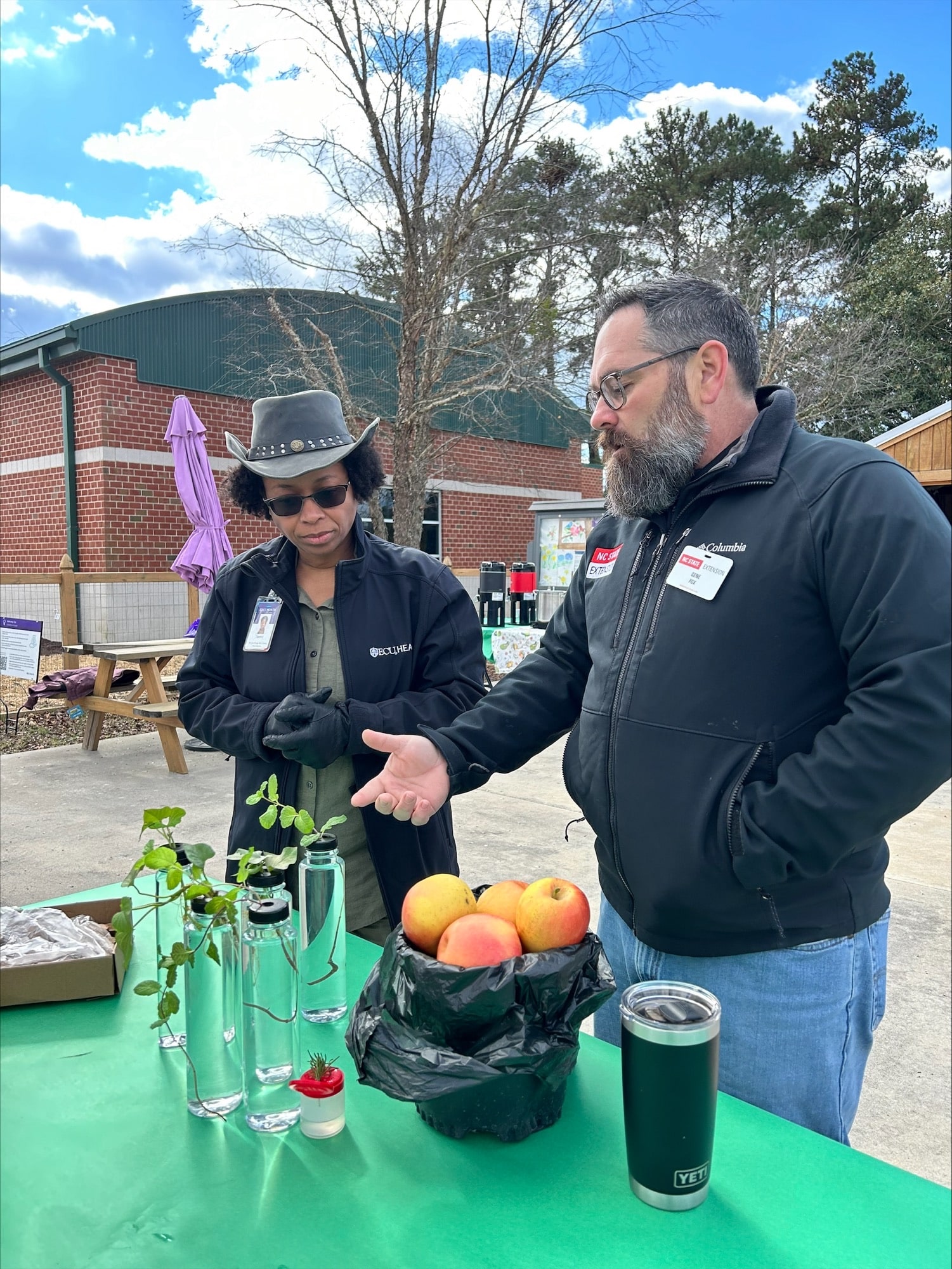
The event’s success was also supported by partnerships and volunteer efforts. The Conetoe Family Life Center contributed additional produce for attendees, while an East Carolina University Public Health intern welcomed guests and shared educational resources.
Volunteers like Cathy Karlovich, were thrilled to be part of the initiative.
“Healthy eating is very important to me,” Karlovich said. “I understand how eating well can impact your whole life, so doing something like this for the community and sharing valuable information is really special.”
Thompson encouraged the community to get involved, noting that volunteer opportunities are available for those interested in supporting the garden and its mission.
“My hope with events like this is to cultivate not just a garden, but a healthier, more connected community,” Thompson said.
The garden is open to community members from 9 a.m. to noon each Wednesday and Friday where any produce ready to be harvested will be distributed and other educational materials will be shared. For more information, please visit ECUHealth.org/WBZ
Healthy snacks, well-being resources, a mindful walking trail and more were all on display at ECU Health Medical Center’s new Resident Well-Being Zone as part of a recent pop-up event hosted by ECU Health’s Well-Being team.
Resident physicians from across the Medical Center were invited to the pop-up event as a way of showcasing the new space, intentionally designed to support their well-being as they continue in their journey in medical education.
The pop-up event, according to Dr. Christina Bowen, ECU Health’s chief well-being officer, is an important way of ensuring residents are aware of the resources available to them at ECU Health.
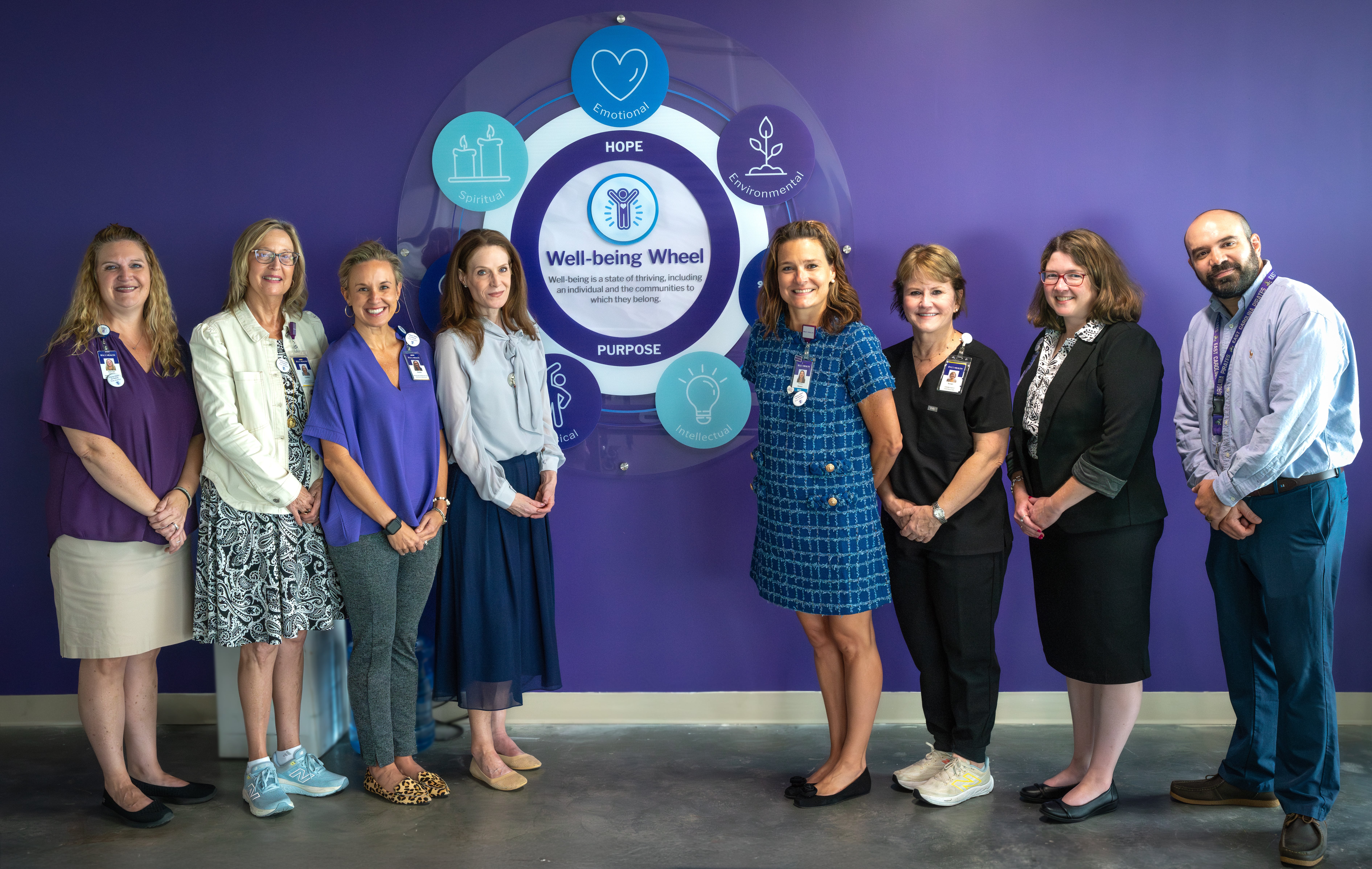
“We are thrilled to have a resident well-being zone and to be able to offer something unique and purposeful to our resident physicians, who play such an important role here at ECU Health Medical Center,” said Dr. Christina Bowen, Chief Well-being officer at ECU Health. “The pop-up events are a fun way to get our resident physicians engaged in well-being and mindfulness which we know will benefit them during their time here at ECU Health. Our team is excited to be able to host well-being events throughout the year.”
Located on the sixth floor of the Eddie and Jo Allison Smith Cancer Center at ECU Health Medical Center, the Resident Well-Being Zone officially opened in August after years of thoughtful design and funding provided by the ECU Health Foundation. The space is filled with all the essentials a resident may need: exercise equipment, charting space, healthy snacks, coffee, even a ping-pong table and more.
Dr. Cole Carter, a fourth-year physical medicine and rehabilitation resident, said the pop-up event and the space itself have proven to be a welcome asset in the resident experience at ECU Health.
“I think it’s great,” Dr. Carter said, noting that his favorite part of the space is the ping-pong table. “It’s a great place to check out when you need a break from the busy schedule. You can get a great view of Greenville and just take time to relax. I try to come up here once a month or so. This is a great asset for our residents and for those who may be looking for a residency program.”
Dr. Mary Catherine Turner, interim associate dean of Graduate Medical Education, understands first-hand the value of a Resident Well-Being Zone. She said she was fortunate to have one during her time as a resident physician, and it helped her take a break, refresh her mind and get re-engaged in the mission-driven work of providing high-quality health care. Now, she is excited that current and future resident physicians get to experience a similar benefit as they care for patients and continue to learn at one of the busiest academic medical centers in the nation.
“A space like this is important for residents,” Dr. Turner said. “Residents need a place where they can go and disconnect from their work for a little bit and reconnect with themselves. And importantly this is a place where residents can congregate together. I think there’s a lot that can be said for building a community, and this allows them the space to do that.”
OUTER BANKS, N.C., July 24, 2024 — Outer Banks Health and Dare County Department of Health & Human Services have joined forces with Blue Zones, the global leader in longevity research and community well-being transformation, to launch Blue Zones Ignite™ Outer Banks.
Blue Zones uses an evidence-based, environmental approach to making healthy choices easier where they live and spend most of their time. Blue Zones will work with Outer Banks Health, the County, and other community leaders to conduct an in-depth feasibility assessment to determine how to make it a healthier place to live, work, and thrive. Together with the community, the Blue Zones team will assess readiness and build a plan for change.
The launch of Blue Zones Ignite is a dream come true for Christina Bowen, MD, Outer Banks Health Center for Healthy Living Medical Director, and ECU Health Chief Well-being Officer.

“We know that 20% of health and longevity is tied to genetics; while 80% is tied to where and how we live. Blue Zones Ignite Outer Banks is going to inspire us to celebrate and promote our strong sense of community while we find ways to make it even easier to eat healthy foods, move naturally and connect with our purpose – just a few of the ways we’ll continue to enhance our well-being and make this an even better place to live and work,” shared Dr. Bowen.
The Blue Zones Approach
Blue Zones employs a proven solution in collaboration with communities to help people live better and longer lives. The company’s work is based on research and principles developed by National Geographic Fellow and New York Times bestselling author Dan Buettner, who identified the cultures of the world – or blue zones regions – with the healthiest, longest-living populations.
The Blue Zones approach focuses on the single largest determinant of health: the place we live. Instead of focusing solely on individual behavior change, Blue Zones helps communities make permanent and semi-permanent changes to policies, systems, streets, surroundings, and social networks so it’s easier for residents to eat wisely, move naturally, and connect more with others as they move throughout their day. By improving the Life Radius®—the area close to home where most Americans spend 90% of their lives—Blue Zones transformations have been able to move the needle dramatically in improving overall population health and well-being. Communities that have participated in the Blue Zone’s Ignite project have seen double-digit drops in obesity and smoking rates, economic investment in downtown corridors, grant funding awards to support policies and programs to improve health equity, and measurable savings in healthcare costs.
“Together, Outer Banks Health and Dare County Health and Human Services are steadfast in our shared mission to enhance the health and well-being of all residents, so that they can live a happy, healthy and long life,” said Dr. Sheila Davies, Director Health & Human Services.
Ben Leedle, CEO of Blue Zones and Co-founder of Blue Zones Project, said: “We are excited to partner with forward-thinking leaders in the joint effort of improving well-being in the Outer Banks. That improvement, at the community level, leads to healthier and happier residents, better and more productive workforces and student bodies, and a more vibrant economy. We are excited to collaborate to create a transformation plan that can generate lasting positive change and ignite a community-wide movement towards sustained well-being.”
The Blue Zones expert team will connect with Outer Banks leaders and organizations to begin immediate work assessing the strengths, needs, and challenges that residents are facing today. Blue Zones will then create a policy-focused transformation plan that, once implemented, can drive widespread improvements in well-being, reductions in healthcare costs, and improve economic vitality in the region.
Chris Smith, the vice president of finance and operations for the ECU Health Foundation, was working out at the ECU Health Wellness Center when the director pulled him aside and told him about the Rock Steady Boxing program – a non-contact, boxing-inspired fitness routine specifically created for patients with Parkinson’s disease and similar movement disorders.
“They were looking for help with starting up the program – equipment, training for a few coaches, that sort of thing,” Smith said. “I told him we’d take a look at how the Foundation could help, and as it turned out, we were able to provide them the funds they needed to get the program started.”
Parkinson’s disease is a neurological disorder that causes unintended or uncontrollable movements, such as shaking, stiffness and difficulty with balance and coordination. Symptoms worsen over time, causing difficulty with walking, talking or other daily activities. While there is no cure, physical activity can improve many symptoms of Parkinson’s disease, slow the progression of the disease process and improve patients’ quality of life.
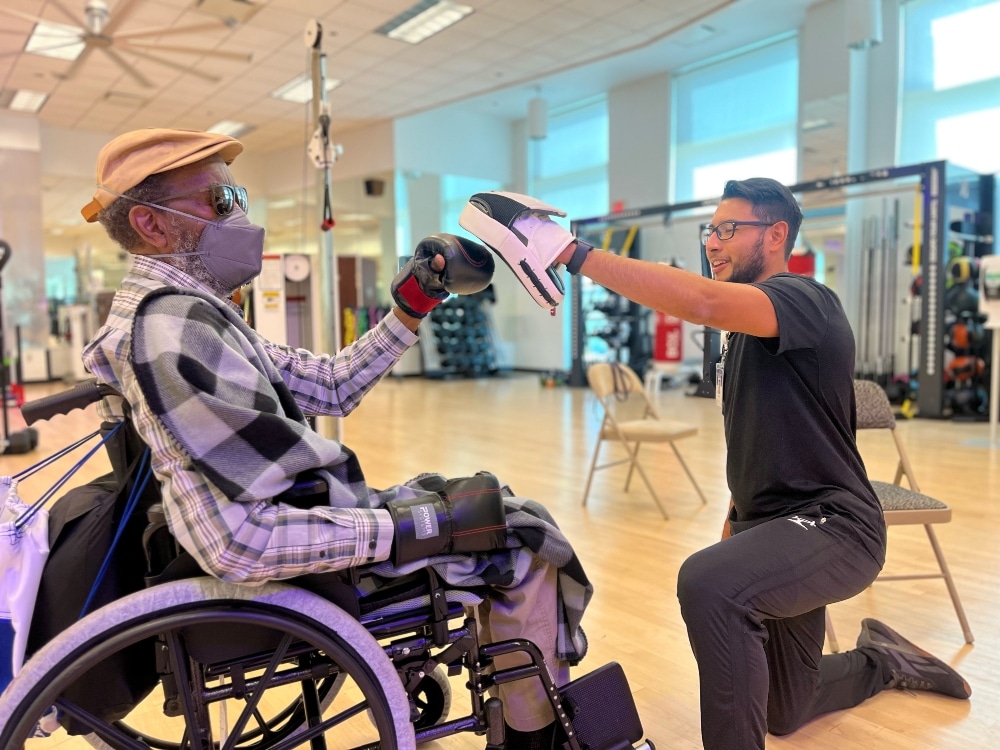
First created in Indianapolis in 2006, Rock Steady Boxing is now an international nonprofit program with more than 840 certified affiliates. Now, ECU Health’s Wellness Center counts itself among those numbers because of the Foundation’s support.
Smith said it was gratifying to know that money given by donors was used in such a meaningful way.
“This demonstrates the impact of what our donors do for their friends and families in the region. It showed the tangible impact philanthropy has on the lives of people in eastern North Carolina.” Smith also had a personal connection to the program; his father had Parkinson’s. “He passed away right before the pandemic. He was doing rehab, but he could never get back on his feet.”
With those donor-provided funds, which covered the cost of coach training in Indianapolis and the necessary equipment, the ECU Health Wellness Center was able to establish a Rock Steady Boxing program in 2023. Two of the coaches trained for the program were Kiara Robins, the lead exercise specialist, and Cas Costa, an exercise physiologist II. More than 36,000 people live with Parkinson’s disease in North and South Carolina, and Costa highlighted the value of having this program in the area.
“I didn’t realize at first the impact it would have, and I didn’t know how few locations offered the class.” That’s true; the ECU Health Wellness Center is currently only one of three locations to offer the program in eastern North Carolina. As a result, Robins said that their class has grown quickly: “We started with just three or four members but now we’re up to ten or twelve. We have people come from Rocky Mount, Kinston, Grimesland, Snow Hill and Ayden looking to do the program. We’re steadily growing, and we’re seeing great results.”
Those results are measured through balance and gait tests, such as the Berg Balance test and the Get up and Go test. “Our first four participants have gone from high fall risks to medium or low risks,” Robins said. “Some couldn’t even complete components of the tests, but they now can.”
Justin Mendoza, one of the participants in the class and its youngest member, attested to the program’s positive effects. “They [the coaches] really put their heart into thinking of exercises. You have someone who has studied this and knows what you’re going through. I’ve improved in my strength and walking, and I don’t fall as often,” he said.
While some clients, like Mendoza, heard about the Greenville class when theirs shut down, others received referrals from their physical therapists or physicians. Dr. Temitope Lawal, an ECU Health movement disorder neurologist, is one of those doctors to refer patients to the program.
“Exercise slows the progression of Parkinson’s,” he said. “It’s an extrapolation of the saying, ‘if you don’t use it, you lose it.’ This program makes you accountable and asks you to move your muscles as much as you can.” Dr. Lawal also noted the social value of the program. “It’s an avenue for interaction with others who have Parkinson’s, so it’s like an informal support group.” Costa agreed: “The biggest benefit is the sense of community. It’s hard to go to a regular gym and know what to do. But here, everyone has Parkinson’s so there’s a level of comfort with the activities.”
That accessibility to specialized exercise programs is just one of the things that sets apart the ECU Health Wellness Center.
“The Wellness Center is more than a gym,” Robins said. “You have trained staff here, all with a degree in exercise and certified in one or more areas to better serve the population.” Costa also emphasized the value of specialty-trained staff. “We’re a wellness center, which is different from a gym. In a gym you can’t see a dietician or a lifestyle coach or go next door for a physical therapy appointment. We have a full-circle of wellness with staff trained to help patients with Parkinson’s, arthritis, orthopedic needs, cancer and other diagnoses.”
Both coaches acknowledged that collaboration is required to make Rock Steady Boxing and other programs successful.
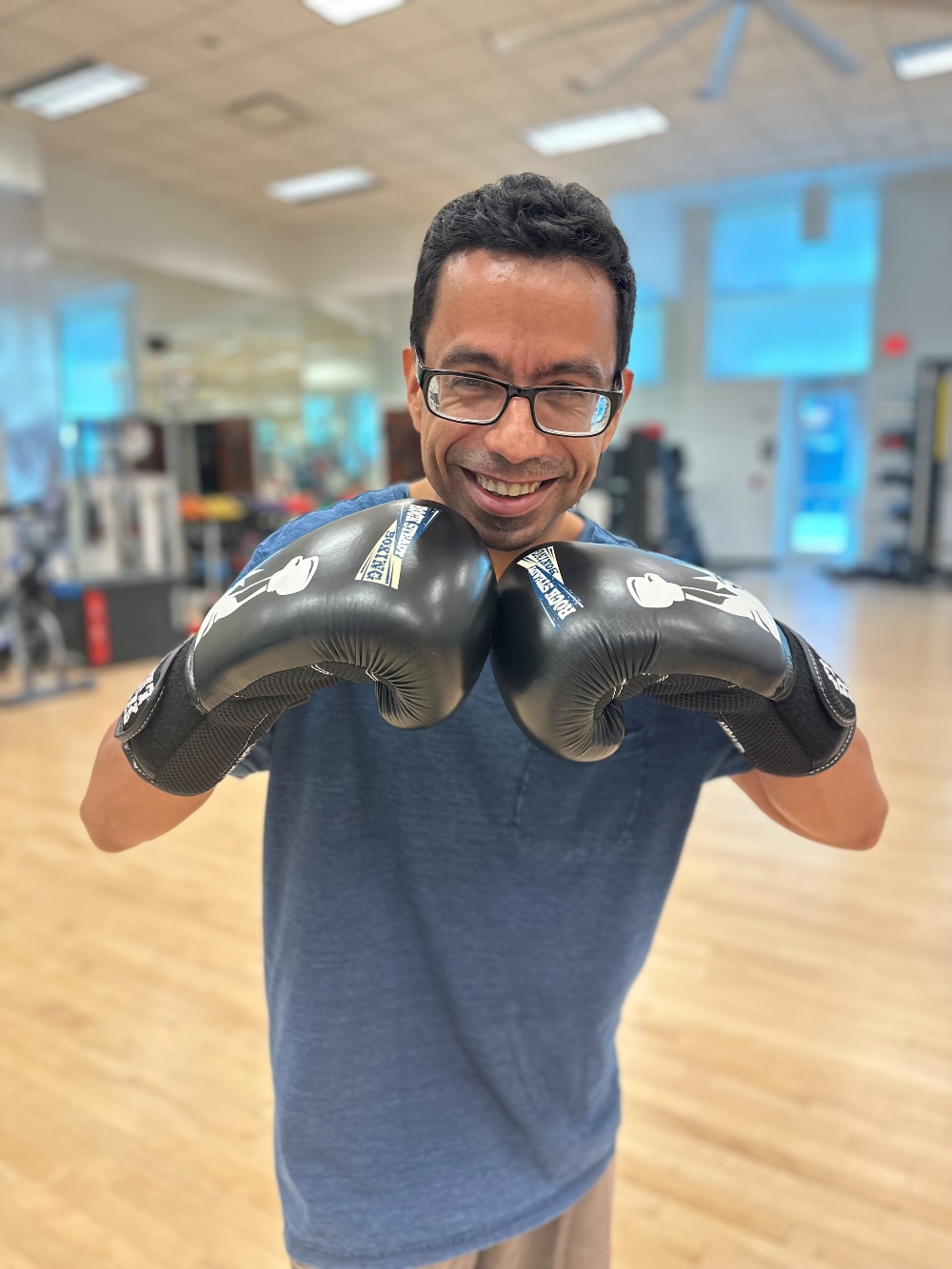
“I’m working towards a Ph.D. in kinesiology, and in school we’re learning about the relationship between physicians and exercise physiologists,” said Costa. “Rock Steady Boxing is an example of that collaboration. ECU Health supporting this program helps us build relationships with the doctors and specialists in the network.”
This partnership provides access to valuable resources and complements the medications patients with Parkinson’s must take to combat the symptoms.
Membership is not required to participate in Rock Steady Boxing. “90 percent of our participants are non-members,” Robins said. Participants pay for eight sessions per month, but there’s also a drop-in rate for those who have less predictable schedules. Those who are unsure if they want to join can observe a class for free, and they can participate in the class on a month-to-month basis with no obligation.
Robins said the program has plans to continue its growth so it can better serve the region, and both she and Costa shared their appreciation to the Foundation for supporting the program.
“We’re grateful to have this program here in Greenville,” Robins said. “We’re still in the beginning stages, but we want to expand as much as we can and get more members. We want to encourage everyone with Parkinson’s to participate and to let them know we’re here to help as much as we can.” Mendoza championed the program and the coaches for their hard work: “I love the class. We have fun, and the coaches know what they’re doing. You don’t feel intimidated or self-conscious, and it gives you a sense of pride.”
ECU Health hosted an open house on March 7 to introduce community members to the newly dedicated space for the Lifestyle Medicine Clinic located in the ECU Health Wellness Center in Greenville.
The Greenville location is one of 12 across eastern North Carolina, designed to help patients live a healthier life through improved nutrition and exercise.
Dr. David Michael, medical director for the Lifestyle Medicine Clinic, said the space is a dream come true for him and the patients he serves.
“I’ve always dreamed that my physician’s office or doctor’s office would look more like a fitness center than a hospital,” Dr. Michael said. “I thought if I could do that, I’d be onto something. So it’s just a blessing to have the lobby of our Lifestyle Medicine Clinic right in the fitness center itself. Exercise and physical activity are such important pillars to healthy living.”
There are six traditional pillars to healthy living that the clinic follows in its work with patients. Those pillars are:
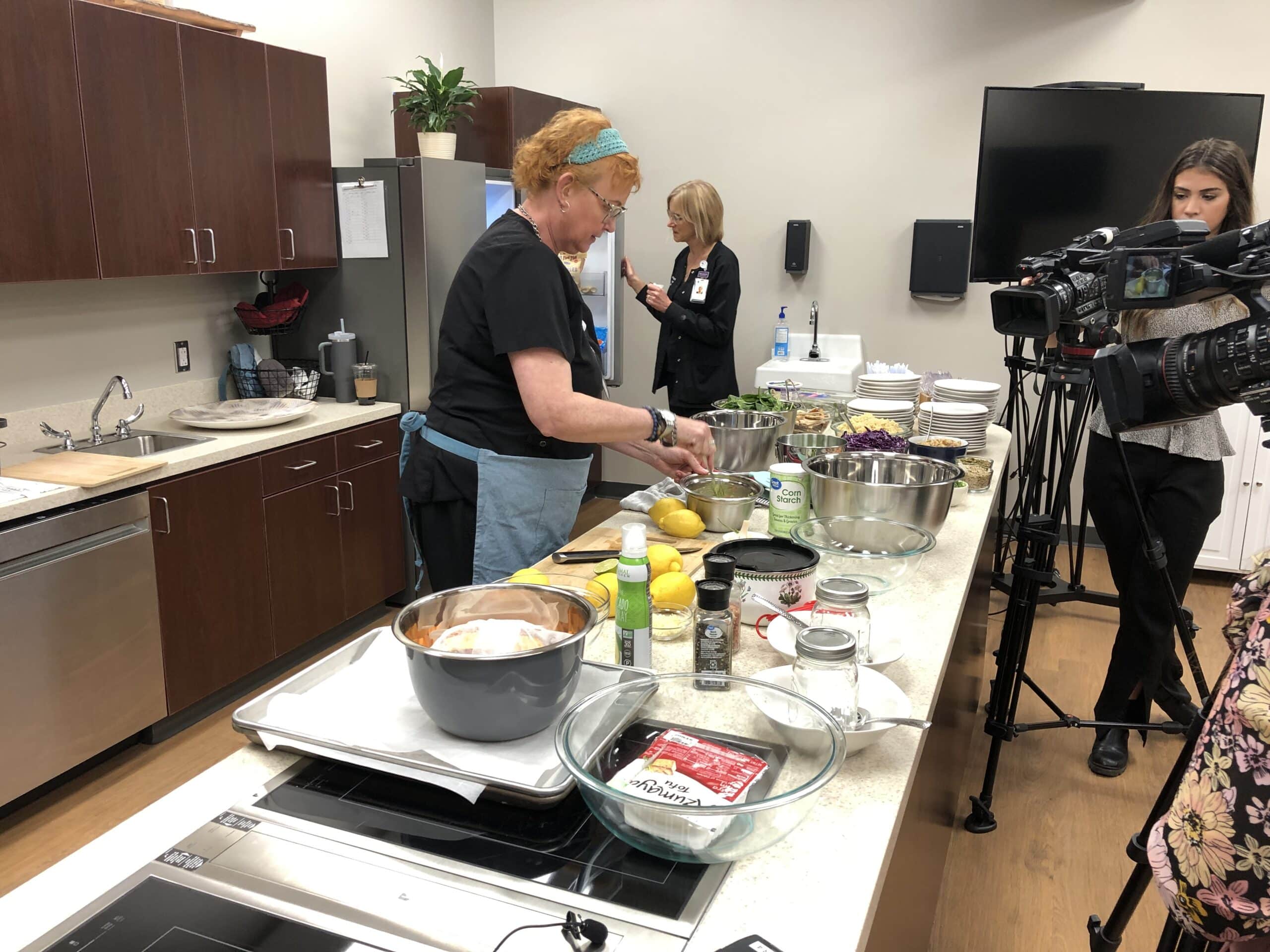
- Healthy eating, including whole, plant-based foods
- Increased physical activity
- Develop strategies to manage stress
- Avoiding risky substances
- Improved sleep
- Form and maintain relationships
Brenda Leigh, director of Lifestyle Medicine at ECU Health, said the program is designed for each individual patient, and the patient’s wants and needs dictate how the program is developed.
“A lot of times people will start with one pillar and try to figure out what’s most important to them, and sometimes it might not even be what they think,” Leigh said. “They come in and say, ‘We want to lose weight.’ After the navigator talks with them for a bit, we realize all the stressors going on in their life. So we might say, ‘First, you really need to work with a social worker or a counselor and set some priorities and get some things ready in your life to then make the nutrition and exercise changes that might help your weight loss.’”
During Tuesday’s open house, the Lifestyle Medicine team also hosted a free “Lunch with a Doctor” and “Dinner with a Doctor” event. During these sessions, ECU Health providers cooked a healthy meal for participants, showed them how to prepare the meal and shared ways to get whole, plant-based foods into their diet.
Susie Houston, a nurse practitioner with ECU Health, prepared the meal for the “Lunch with a Doctor” event. She said educating attendees and showing them how to cook a tasty meal with the ingredients that typically get left behind in the grocery store is a priority during these events.
For lunch, the team put together a power bowl with tofu, vegetable toppings and a homemade dressing that attendees could choose from.
“When you think of the color of the rainbow with what we’re preparing today, you’re pretty much getting all the vitamins, minerals and then fiber that you need,” Houston said. “So if we use food as medicine, it’s this great idea that in the grocery store, if we could stick in the produce section or the perimeter in the store, that just makes a difference.”
The team plans to continue to host these free events in the future.
Leigh said she knows this program can change lives for patients as studies have shown healthy habits like diet and exercise can help slow, stop or even reverse chronic health conditions like diabetes and heart disease.
March is National Nutrition Month – start your journey to better health with the Lifestyle Medicine programs available across eastern North Carolina by calling 252-847-9908.
Resources
ECU Health Beaufort Hospital, a campus of ECU Health Medical Center, hosted free community health screenings, produce giveaways and educational information at its first fall harvest event at the new community garden and outdoor classroom on Nov. 18.
The community garden and outdoor classroom, located next to the ECU Health Wellness Center in Washington was made possible — in part — by a grant from the Robert Wood Johnson Foundation and the garden was developed by the ECU Health Patient Education team in collaboration with ECU Health Beaufort Hospital. Internal partners include the ECU Health Beaufort Hospital Food & Nutrition Services team, Community Health Improvement team, Volunteer Services, the Wellness Center, and Facilities & Properties.
“It has been wonderful working with such an innovative team,” said Tammy Thompson, director of Experience Engagement, Education and Design at ECU Health. “They have been true partners throughout entire process.”
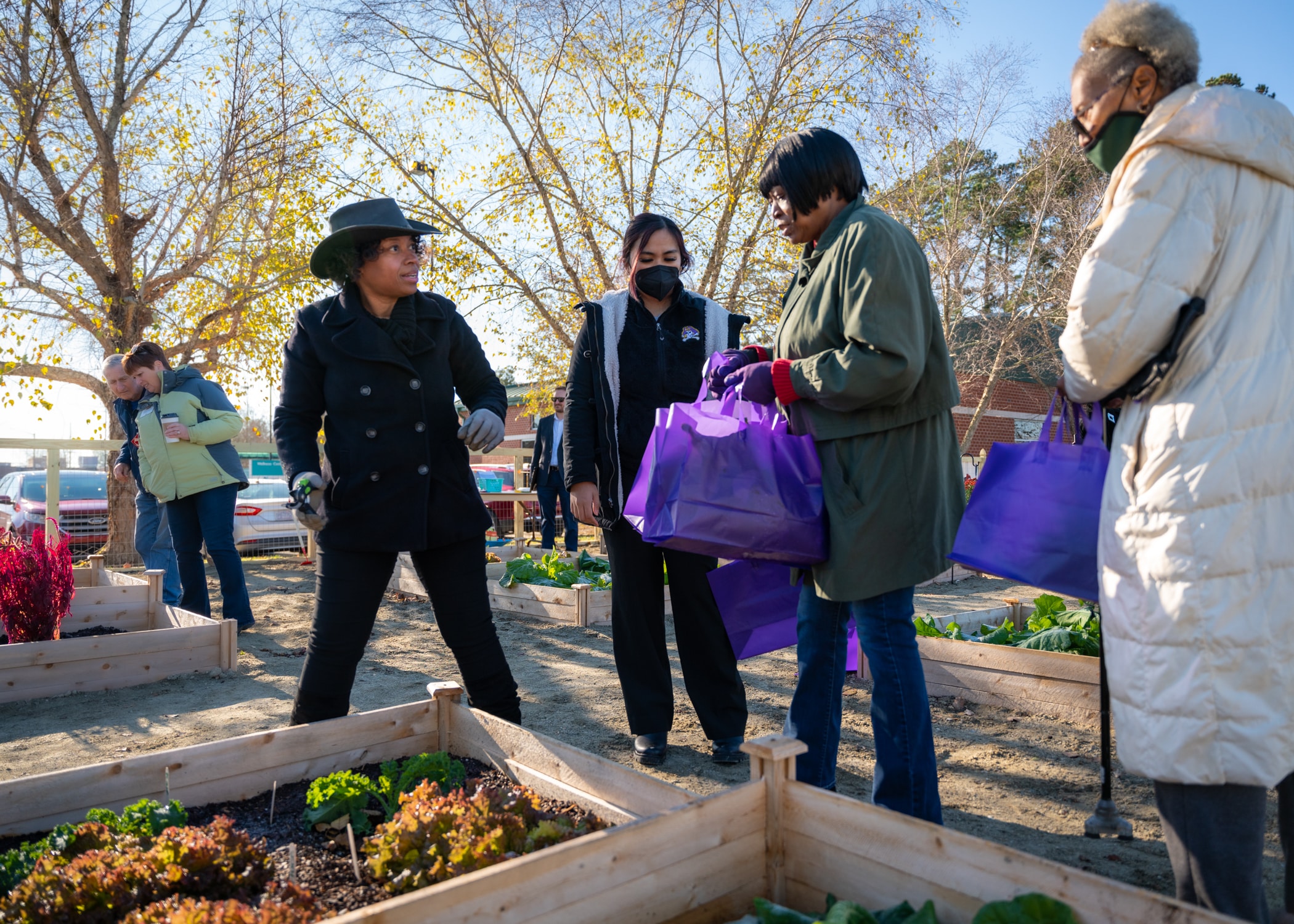
Sowing the seeds for health and well-being
Over the summer, the garden started to take shape, resulting in 10 raised beds for vegetables, two large metal planters for herbs, fencing, a shed and space for community members to come together and learn outdoors. The hospital planted the first crops in September for the first harvest event.
Pam Shadle, director of Marketing, Community Outreach and Development at ECU Health Beaufort Hospital, said the opportunity to come together as a team and create something that will benefit the community has been a great experience.
“It’s been a labor of love since the creation of the idea,” Shadle said. “So many of our team members from various departments came together to make this happen, so it’s been a great opportunity for our folks to get involved and I really appreciate that.”
Shadle said the community garden and outdoor classroom is an integral addition to their community health improvement plan for Beaufort and Hyde county residents. While they already feel the great impact of existing programs on community health, the garden will help create new opportunities and help improve those established programs, Shadle said.
Beyond the harvest
The ECU Health Food and Nutrition Services team joined the event and shared easy-to-make recipes inspired by the garden’s produce — which includes vegetables and herbs like broccoli, collards, kale, lettuce, rosemary and thyme. Along with the opportunity to take home fresh, free produce, clinical teams were on hand to offer health screenings for community members, and the Wellness Center team shared information about lifestyle medicine and other services to support community wellness.
“It’s just a great complement to include these offerings because what we’re trying to do is not solely about food,” Dr. Thompson said. “We call these living-learning labs because of the interactive engagement to support healthy lifestyles. This is an opportunity for community members to receive a variety of information and resources for better health.”
ECU Health Chief Experience Officer Julie Oehlert, DNP, RN, said the garden is an important step in the community health work in eastern North Carolina.
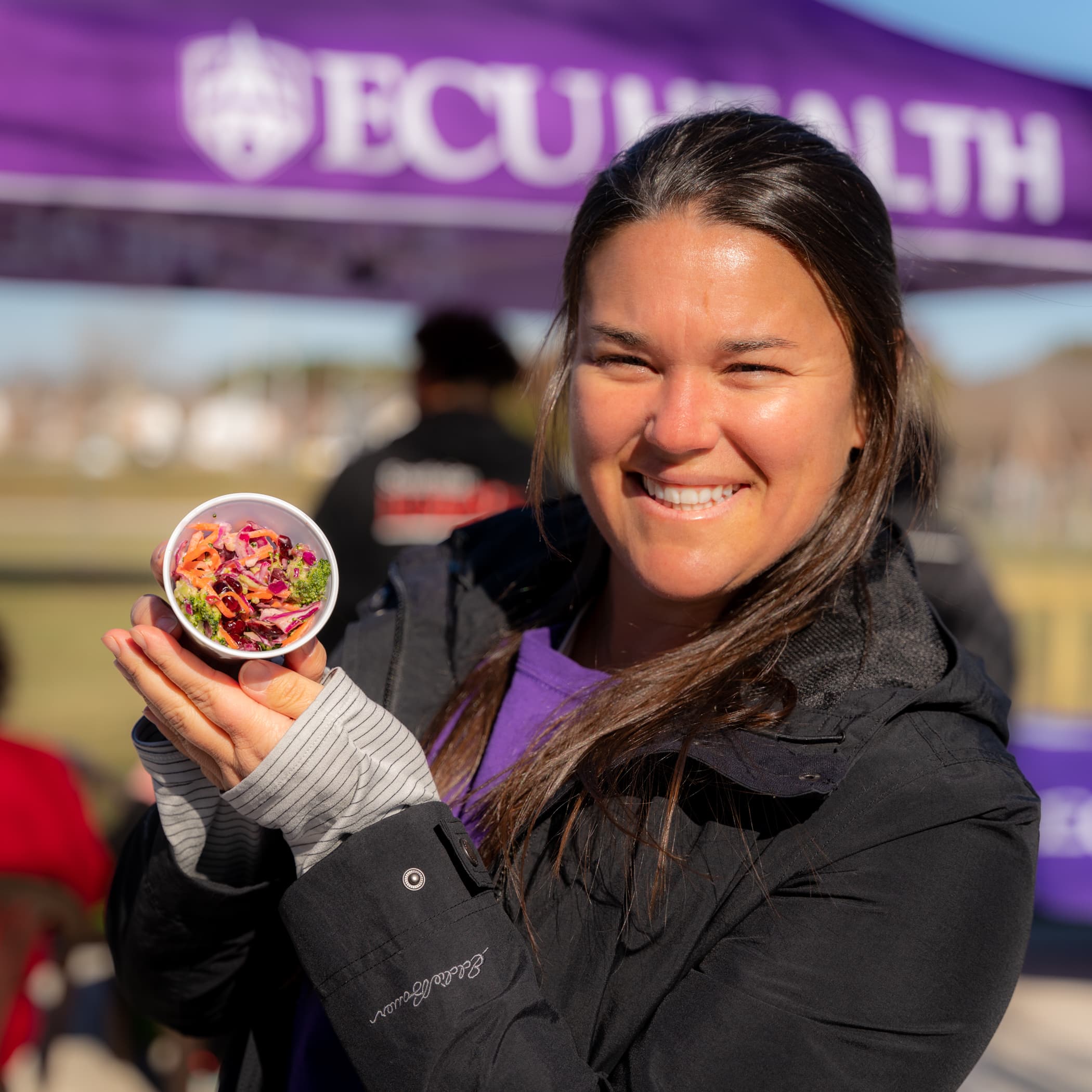
“We’re so proud of the teams that made this garden a reality,” Dr. Oehlert said. “It’s going to benefit community members, team members and patients in the hospital and I think it’s really special for us to connect with the communities we serve in this way. We’re excited to offer something unique for Washington and Beaufort County and I know we’re going to learn so much from this project.”
Planning your visit
The garden will be open to community members from 9 a.m. to noon each Wednesday and Friday where any produce ready to be harvested will be distributed and other educational materials will be shared.
Greenville, N.C. – Feb. 24, 2022 – Vidant Health is pleased to announce that Christina Bowen, M.D., ABOIM, DipACLM, has been named Vidant’s first Chief Well-being Officer, and will champion well-being efforts through the lens of team member and provider engagement and equity.
“I am excited about this new role and our commitment to our team’s well-being,” said Dr. Julie Oehlert, Vidant Health Chief Experience Officer. “There is nothing more valuable and contributory to our health care outcomes than the wonderful humans that show up every day to deliver health care and caring to the communities we serve.”
As Chief Well-being Officer effective Jan. 1, 2022, Dr. Bowen is responsible for collaborating with the entire organization to develop, guide and implement team member and provider well-being and resilience initiatives founded on evidence-based best practices and organizational data. She also collaborates with Vidant’s wellness teams to introduce and support new programs that positively influence the population health of the communities in which we proudly serve.
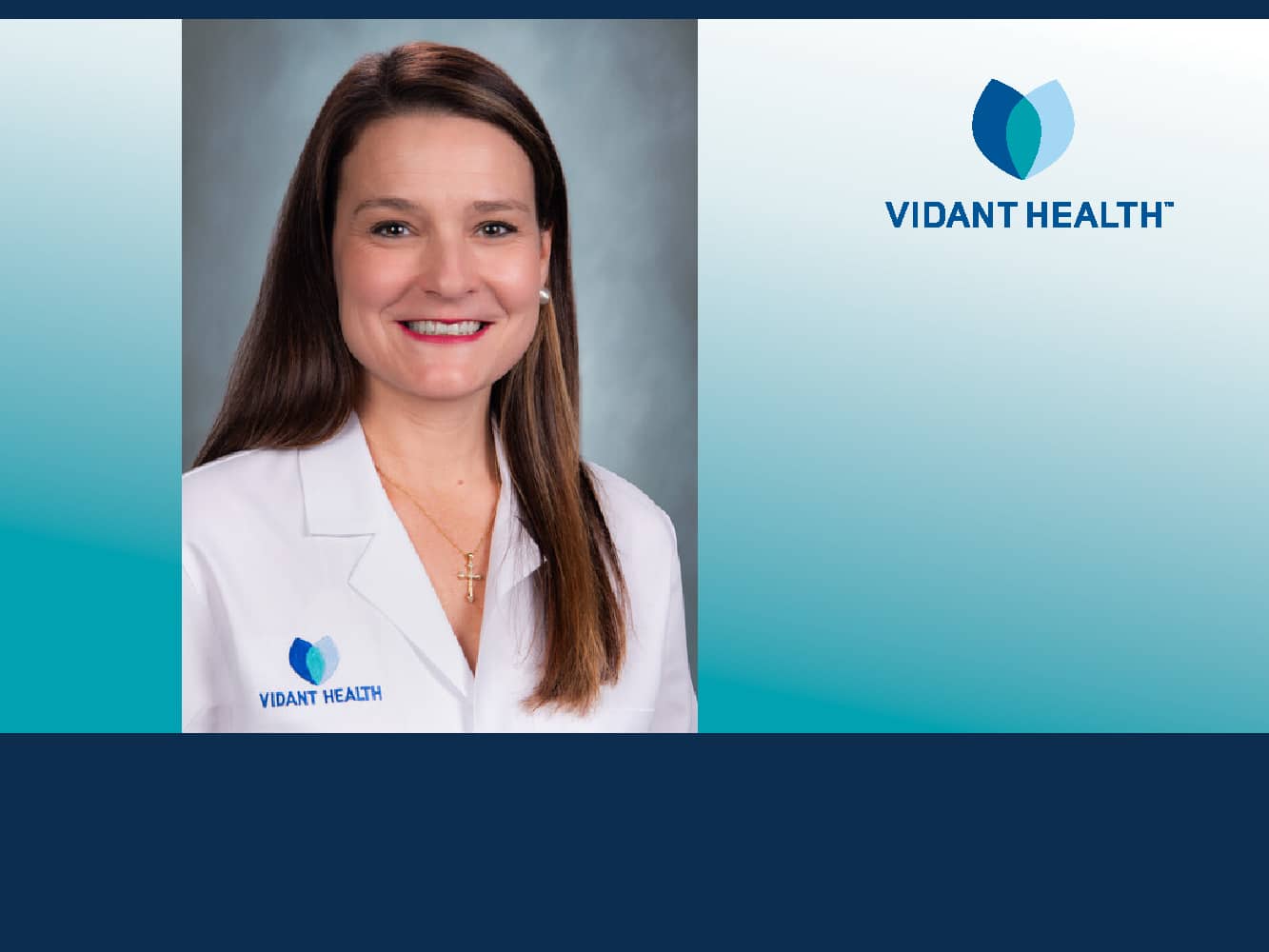
“I am proud to be a part of a health care organization that recognizes the importance of the overall team member experience and is committed to optimizing well-being and resilience efforts,” said Dr. Bowen. “I am very grateful to have the opportunity to pursue my passion of integrated medicine while also positively influencing the communities that I love. This is a way for Vidant to come alongside everyone who has provided amazing care to our patients, especially during the pandemic, and make sure our team members are taken care of and their wellness is in the forefront.”
In addition to serving as Chief Well-Being Officer, Dr. Bowen is an integrative medicine physician with ECU Health Physicians and the Medical Director of The Center for Healthy Living at The Outer Banks Hospital. Her previous roles at Vidant include Medical Director of the Office of Experience and Medical Director of Integrative Oncology. Dr. Bowen is board certified in family medicine, hospice and palliative medicine, lifestyle medicine and integrative medicine, and has received numerous honors and awards, including The National Organization of State Offices of Rural Health’s North Carolina’s Community Star in 2020.
“The creation of this role brings continued focus to our intention of belonging,” said Mark Dunn, Chief Diversity, Inclusion and Talent Management Officer, Vidant Health. “It is important to be our authentic selves at work and in the communities we live in and serve. Our collective well-being is important not only to our patients, but to our families. This role will help us provide support and development in an area that is needed now more than ever.”
A native of eastern North Carolina, Dr. Bowen graduated from East Carolina University in 2003 with a doctorate in medicine. In 2004, she completed her internship at Duke University Medical Center and completed her residency at Carolinas Medical Center in 2008. In 2016, she completed a fellowship in Integrative Medicine at the University of Arizona under Dr. Andrew Weil — world-renowned leader and pioneer in the field of Integrative Medicine.
After closing in June 2020, we spent several months diligently assessing how to best utilize the building, while also exploring how to improve access to patient services. Balancing both the community’s passion for the Greenville-based Wellness Center, as well as the need to expand patient services, the organization carefully redesigned the Wellness Center’s space and service model that is mission-focused and sustainable.
The Wellness Center in Greenville will re-open later this year as a destination facility for Vidant’s wellness and outpatient rehabilitation services. Additional details about timing, employment opportunities and memberships at the Wellness Center in Greenville will be shared in the coming months.
Fitness Center
Fitness Center offerings will include membership access to exercise equipment, pool and aquatic programs, group exercise classes, personal training and a KidZone. Services like the Café, CrossFit, children’s gym and camps will not be offered in the revised model.
Outpatient Rehabilitation Services
Vidant’s three Greenville-based outpatient rehabilitation clinics will all relocate to new space at the Wellness Center. This centralized location will improve convenience and accessibility for patients as well as team member collaboration. Vidant Outpatient Rehabilitation includes adult, children and aquatic programs; comprehensive speech, physical and occupational therapy; and many specialty services.
Lifestyle Medicine Clinic
The Lifestyle Medicine Clinic currently housed at the Greenville-based Wellness Center will continue to offer patient visits with medical providers for nutrition, weight loss, diabetes, tobacco cessation, exercise as medicine and other lifestyle treatments. The clinic will also provide wellness programs to Vidant team members.
Ahoskie and Washington Wellness Centers
Vidant plans to resume operation of the Wellness Centers in Ahoskie and Washington, which have been closed due to COVID-19. Outpatient rehab and cardiopulmonary rehab services remain open in the Washington Wellness Center. Children’s after school and upcoming summer camps also remain open in the Ahoskie Wellness Center. The timing for opening these facilities, along with the Greenville-based Wellness Center, is dependent on the ongoing impact of the pandemic.
Vidant remains committed to meeting the health care needs of eastern North Carolina and improving the health and well-being of the region.
